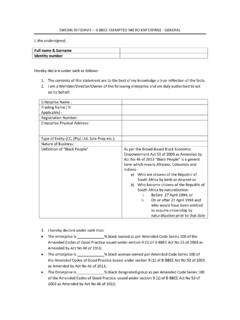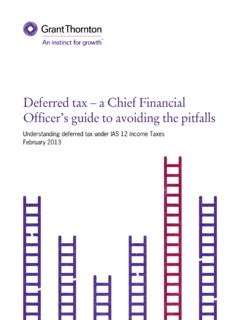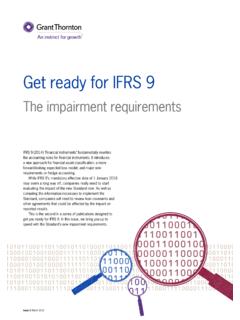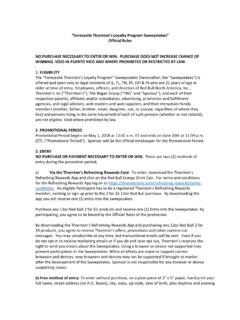Transcription of King III vs King IV What you really need to know
1 What you really need to knowRelevance to all types of businesses,less complex and more clearly definedBesides needing a revision due to a number of changes and advances in the local and international environments, King IV is trying to be more relevant for a broader range of organisations. As an example, the reference to Board from King III has been changed to Governing Body throughout the King IV report to acknowledge that not all organisations have Boards. In addition, sector supplements have been introduced for NPO s, Municipalities, Retirement Funds, SOEs and SMMEs. The complexity of the Code has been simplified and the number of principles significantly reduced for most organisations, from 75 to 16.
2 The 17th principle is only applicable to listed companies and relates to responsible clear description of Governing Body rolesThe primary roles of the Governing Body have also been clearly defined in King IV as follows: Steering the organisation and setting the strategy, whilst defining the way in which the specific governance areas are approached, addressed and implemented; Approving policy and ensuring planning giving effect to the approved strategy and direction; Overseeing and monitoring the performance of the organisation and the execution of the strategy by the Executive; and Ensuring accountability for organisational performance, by means of amongst others, ethical and transparent reporting and III vs King IV It is hoped that King IV will result in quality governance on the part of directors and help change corporate behaviour by adopting integrated thinking.
3 The business landscape has changed dramatically in the intervening years (between King III and IV) and economic uncertainty has increased, the need for strong governance has never become more apparent . Mervyn King, Chairman, King Committee on Corporate GovernanceThe King IV Code on CorporateGovernance builds on the strengthsof King III and is based on the same philosophical foundations, but there has also been a refining and re-enforcement of key concepts. King IV replaces King III in its entirety and the new Code is effective for financial years commencing from April 2017,although an immediate transmission to King IV is encouraged.
4 For those organisations who have mindfully applied King III, the transition should not be too onerous. As with King III, the application of the King IV Code is voluntary and is viewed as a best practice approach towards good governance. Various pieces of legislation, like the Companies Act, JSE Listing Requirements, the Public Finance Management Act and the Municipal Finance Management Act contain governance requirements that are mandatory to III vs King IVAnother key change is that King IV is the first code that is outcomes-based to demonstrate what can be achieved if governance principles are implemented effectively.
5 This enhancement is to try and reduce the tick box or mindless compliance approach when applying King corporate governance principles. The governance outcomes that an organisation should strive to achieve are: An ethical culture Good performance Effective control LegitimacyThis encourages organisations to focus on what they want to achieve through implementing the recommended principles and good governance practices. The 17 principles build on and re-enforce each other and they are supported by 208 practices that will assist in achieving the governance outcomes. King IV encourages mindful consideration of the application of the principles and practices.
6 The practices are recommended to achieve an optimal level of governance and should be adapted to take into account the size, resources and complexity of each organisation so that the principle is applied and the governance outcome is ultimately just a tick box approach outcomes basedThe code requires an apply and explain approach, not apply or explain which was required by King III. This means that an application of the principles is assumed and companies now need to explain how they have implemented the practices to achieve the governance principles and outcomes in a way that is practical to their imperative in King IV.
7 While explanation is now also requiredLeadership by the Governing BodySteers and sets strategic directionApproves policy and planningOversees and monitorsEnsures accountabilityThe 17 Principles of King IVincluding practicesGovernance outcomesEthical cultureGood performanceEffective control LegitimacyKing III vs King IVThe chapters have also been reduced from 9 to 5 and they are organised according to the following themes (these themes can be found in section 5 of the King IV Report):Chapter 1 (Part ) - Leadership, Ethics and Corporate Citizenship there are 3 principles in this chapter very similar to King III: Principle 1 the Governing Body should lead ethically and effectively (integrity, competence, responsibility, accountability, fairness and transparency); Principle 2 the Governing Body should govern the ethics of the organisation in a way that supports the establishment of an ethical culture (policy setting, oversight of ethics and disclosure of ethics performance).
8 Principle 3 the Governing Body should ensure that the organisation is, and is seen to be, a responsible corporate citizen (setting direction, overseeing and monitoring, compliance, disclosure including consequence of outputs from their value chain).Chapter 2 (Part ) - Strategy, Performance and Reporting there are two principles in this chapter: Principle 4 the Governing Body should appreciate that the organisation s core purpose, its risks and opportunities, strategy, business model, performance and sustainable development are all inseparable elements of the value creation process (six capitals); Principle 5 the Governing Body should ensure that reports issued by the organisation enable stakeholders to make an informed assessment of the organisation s performance and its short, medium and long-term prospects (sustainability).
9 Chapter 3 (Part ) Governing Structures and Delegation there are five principles in this chapter and cover the areas previously contained in King III chapter 2 on Boards and Directors: Principle 6 the Governing Body should serve as the focal point and custodian of governance in the organisation; Principle 7 the Governing Body should comprise the appropriate balance of knowledge, skills, experience, diversity and independence for it to discharge its roles and responsibilities objectively and effectively; Principle 8 the Governing Body should ensure that its arrangements for delegation within its own structures promote independent judgement, and assist with balance of power and the effective discharge of its duties; Principle 9 the Governing Body should ensure that the evaluation of its own performance and that of its committees, its chair and individual members supports continued improvement in its performance and effectiveness.
10 Principle 10 the Governing Body should ensure that the appointment of and delegation to management contribute to role clarity and the effective exercise of authority and IV chapters reduced from 9 to 5 Part -Leadership, Ethics and Corporate CitizenshipPart -Strategy, Performance and Reporting Part Governing Structures and Delegation Part Governance Functional AreasPart Stakeholder Relationships CONTACT US:Carla ClampDirector: Business Risk ServicesT +27 (0)10 590 -7200C +27 (0)82 570 0379E 2017 grant thornton South Africa. All rights reserved. grant thornton South Africa is a member firm of grant thornton International Ltd (GTIL).










